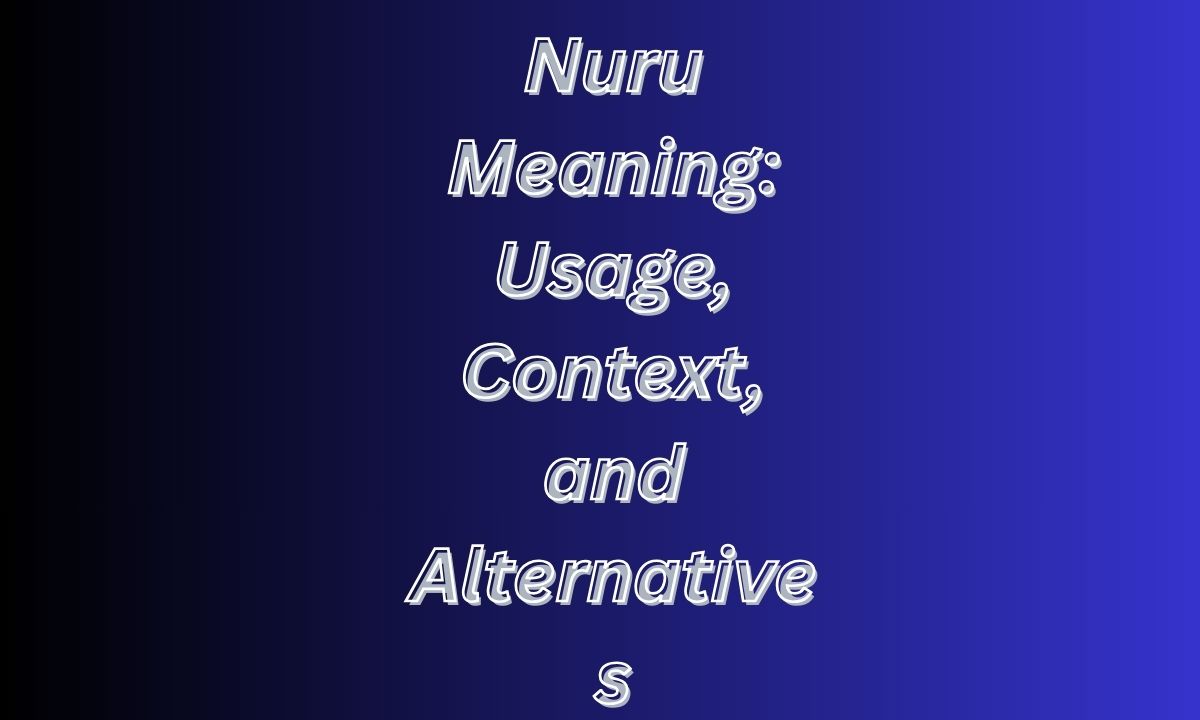The term “nuru meaning” often sparks curiosity because it is used differently depending on context, culture, or conversational tone. While its surface translation may appear straightforward, its deeper understanding requires exploring nuances in language and usage.
In many texts, expressions like “nuru” carry layered interpretations. The meaning of “nuru” can shift based on intent—ranging from professional usage to casual speech. Understanding these variations enriches communication and prevents misinterpretations in both spoken and written contexts.
This article explores the hiatus meaning of “nuru meaning”, its usage in text, and its place in modern communication. Along the way, you will learn polite, professional, and casual alternatives, practical examples, and guidance on choosing the right expression for any situation.
Nuru Meaning
The word “nuru” is often translated as “light” or “illumination” in certain languages, but its interpretation has extended into broader contexts, especially in contemporary English usage. When someone refers to the “nuru meaning”, they may imply clarity, guidance, or even an uplifting feeling associated with communication.
In text messages or digital communication, “nuru” is sometimes used symbolically to represent positivity or a break in tone, similar to the way “hiatus” suggests a pause. Thus, nuru meaning in text can also stand for comfort, encouragement, or a subtle shift in mood.
The versatility of the word makes it adaptable in different settings—ranging from casual messages between friends to professional conversations that emphasize clarity and goodwill.
Nuru Meaning in Text
When people encounter “nuru meaning in text”, they are often curious about its purpose in digital communication. Much like “hiatus meaning,” which signals a pause or temporary break, “nuru” adds a subtle layer of expression.
For example, in a casual conversation, a friend might write, “Stay in the nuru,” symbolizing encouragement or brightness during a challenging moment. In professional settings, however, the usage of “nuru” is less direct and more metaphorical, often appearing in motivational contexts.
Therefore, understanding nuru meaning in text allows readers and speakers to grasp whether the intent is lighthearted, professional, or deeply symbolic.
Exploring Hiatus Meaning in Relation to Nuru
The hiatus meaning is commonly understood as a pause or break, especially in writing, media, or personal commitments. When compared with “nuru,” which conveys light or continuation, we see an interesting contrast.
Where “hiatus” represents a gap, “nuru” symbolizes presence—an ongoing thread of communication and encouragement. This duality provides balance: one emphasizes stepping away, while the other highlights staying connected.
By examining both, communicators gain tools to decide when to express pause (hiatus) and when to convey support or brightness (nuru).
Polite Alternatives to “Nuru Meaning” and “Hiatus Meaning”
In professional and personal interactions, tone matters. Here are 15 examples of alternatives that align with polite, professional, and casual tones. Each example includes an explanation of context for better clarity.
1. Pause in Communication
A professional way to describe a short break without using “hiatus.” Example: “We will take a short pause in communication for clarity.”
2. Break Period
Common in workplaces to indicate a temporary stop. Example: “Our team will observe a break period before continuing.”
3. Intermission
Often used in creative or formal settings. Example: “The intermission allows us to reflect before resuming.”
4. Interval
Neutral and polite, often applied in academic or formal speech. Example: “There will be an interval between the sessions.”
5. Temporary Suspension
Professional in tone, frequently used in legal or corporate environments. Example: “The project is under temporary suspension.”
6. Moment of Rest
Gentle and polite, suited for supportive or personal contexts. Example: “Take a moment of rest before continuing.”
7. Short Break
Simple and casual, perfect for friendly conversations. Example: “Let’s take a short break before we go on.”
8. Time Away
Polite and caring, often used in personal or supportive tones. Example: “You may need some time away to recharge.”
9. Respite
More formal, often connected with relief or a needed pause. Example: “A brief respite will help restore balance.”
10. Recess
Professional in legal and educational settings. Example: “The court will now be in recess.”
11. Breather
Casual and friendly, good for informal conversations. Example: “Let’s take a quick breather before moving on.”
12. Downtime
Professional yet relaxed, often used in workplaces or tech fields. Example: “Scheduled downtime ensures proper system maintenance.”
13. Break in Progress
Neutral and clear, suitable for formal and informal contexts. Example: “There will be a break in progress before resumption.”
14. Pause for Reflection
Gentle and thoughtful, excellent in professional, academic, or personal settings. Example: “A pause for reflection helps us grow.”
15. Temporary Break
Direct and versatile, suitable for most situations. Example: “The meeting is on a temporary break.”
Choosing the Right Alternative
Selecting the correct alternative depends on tone, context, and relationship with the audience. For instance, in corporate communication, words like “temporary suspension” or “interval” maintain professionalism. In casual conversations, “breather” or “short break” feels more natural.
Meanwhile, “pause for reflection” can enrich personal growth discussions, whereas “downtime” resonates in technology or workplace settings. Understanding these nuances ensures communication feels intentional and well-tailored.
Why Alternatives Matter
Language is never static. By exploring both nuru meaning and hiatus meaning, along with their alternatives, speakers and writers gain flexibility. Having multiple options prevents repetition, conveys subtle emotions, and enhances clarity.
Alternatives also allow a speaker to adjust tone depending on whether they are addressing colleagues, friends, or a professional audience. This adaptability is a hallmark of effective communication.
Conclusion
The exploration of nuru meaning reveals how words evolve in modern communication. While its roots symbolize light or positivity, its usage in text has expanded into metaphors of encouragement and connection. By contrasting it with hiatus meaning, we gain a deeper appreciation for pauses and presence in language.
Polite, professional, and casual alternatives—such as “pause in communication,” “moment of rest,” or “breather”—equip us with versatile tools for expression. Ultimately, the right word choice depends on tone, relationship, and context, ensuring clarity and goodwill in every interaction.

Elizabeth crafts heartfelt messages for every occasion—anniversary wishes, love notes, prayers, thank-yous, and inspirational greetings—bringing warmth, joy, and connection to your special moments.










